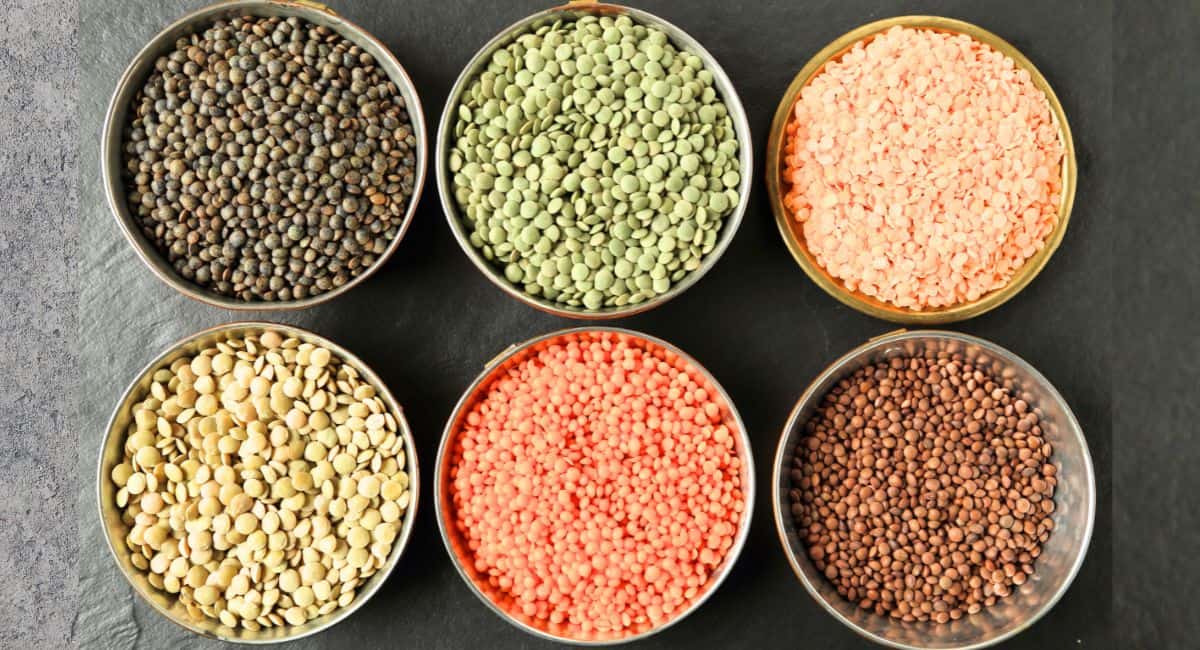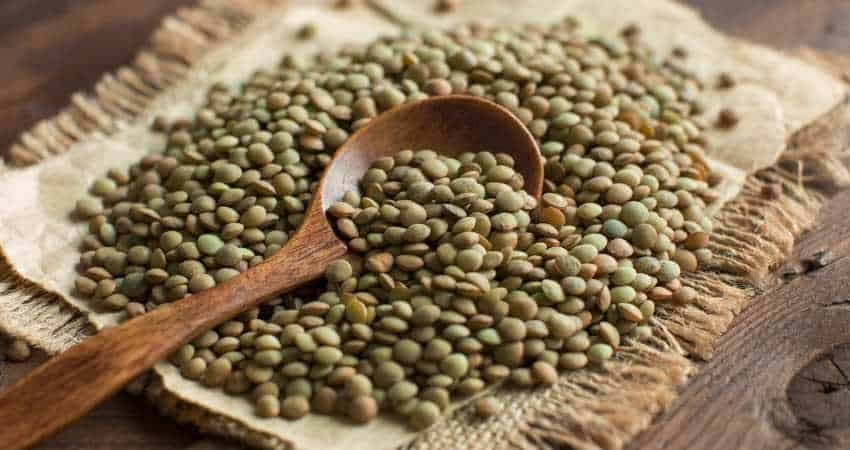What are Lentils? Types and Their Benefits
Lentils are seeds that are part of the legume family. They were originally grown in the Middle East around 8000 B.C., making them one of the world’s oldest health foods. Today, they are found all over the globe but are especially prominent in Asia and North Africa1.
Lentils come in a variety of colors and flavors. They are often added to soups, stews, curries, salads, and more.
What Are the Different Types of Lentils?
The most common types of lentils are2:
- Brown lentils are the most common type. They have a delicious earthy flavor and are great in a variety of foods, including soups and curries.
- Puy lentils are more expensive than other lentil varieties. They are grown in the Le Puy region of France.
- Green lentils have a peppery flavor, so they taste great on salads or in warm dishes. They take the longest to cook, approximately 45 minutes.
- Yellow and Red lentils have a nut-like flavor. They are commonly found in Middle Eastern and Indian cuisine.
- Black lentils, otherwise known as beluga lentils, have an earthy flavor that bears a striking resemblance to black beans. These are the most nutritious types of lentils.

What Are the Health Benefits of Lentils?
Lentils are incredibly wholesome legumes that offer numerous health benefits.
High in Protein
One amazing benefit of lentils is that they are inexpensive yet very high in protein. Because of this, they are considered to be a great substitution for meat for individuals with high cholesterol or people who choose not to eat meat, such as vegetarians and vegans3.
Great Source of Fiber
Lentils also have a lot of fiber. Fiber helps curb appetite and can lower cholesterol. Fiber also has a protective effect against certain diseases. Additionally, fiber is great for the digestive system.
One serving of lentils provides you with 32% of your recommended daily fiber intake, making them a very beneficial addition to your diet4.

Contain Essential Nutrients
The benefits don’t end there. Lentils also provide your body with several nutrients, including potassium, folate, and iron5.
- Potassium is a crucial nutrient that many people don’t get enough of. It supports normal nervous system functioning and helps regulate muscle and heart contractions. If your potassium levels are too low, you can experience weakness of the muscle, an irregular heartbeat or high blood pressure6.
- Folate is needed to make red and white blood cells, DNA, and RNA. It also plays an important role in converting carbohydrates into energy. Therefore, it is important to get enough folate during periods of rapid growth, such as pregnancy, infancy, and adolescence.
- Iron is essential for a number of vital body functions. When people have too little iron, they can experience tiredness, heart problems, pale skin, and shortness of breath. Iron deficiencies during pregnancy increase the mother’s chances of having a premature baby that has a low birth weight. Low iron levels can also lead to cognitive and behavioral impairments in newborns.

Scientific Studies Involving Lentils
In one study7 of 48 obese individuals, researchers found that eating one-third cup of lentils per day resulted in higher levels of “good cholesterol” and decreased levels of “bad cholesterol.”
Furthermore, research conducted on rats found that lentils reduced blood pressure more than other foods, including peas, chickpeas, or beans. Lentils may also be able to reduce blood pressure by blocking the effects of the angiotensin I-converting enzyme (ACE), which normally causes blood vessels to contract8.
Lastly, lentils are full of fiber and are very filling. Because of these, they may help lower overall food intake and decrease the chances of obesity, which is a risk factor for heart disease.
Check out the differences between red and white quinoa in my article, Red Quinoa vs White Quinoa: What’s The Difference?
Contain Polyphenols
Lentils contain polyphenols, a type of plant compound that may have significant health benefits.
The polyphenols found in lentils are known for their powerful anti-inflammatory effects. In fact, one study discovered that lentils are able to inhibit the production of cyclooxygenase-2, which is an inflammation-inducing molecule9. Eating foods that prevent inflammation is important because it is often the root of many chronic illnesses.
Additionally, a lab study found that the polyphenols in lentils may be able to stop the growth of cancer cells10.
While the studies of polyphenols are still preliminary, the possible benefits you may receive from including them in your diet are astounding.
Find out how quinoa compared to lentils in my article, Quinoa vs Lentils: Which is Better? A Complete Comparison.
If you have any questions about this article don’t hesitate to comment below or email us. You can find an email on our contact page.
Read Next – More Food Articles
Legumes vs Nuts: What’s the Difference? A Comparison
Organic Spinach vs. Regular Spinach: What’s the Difference?
Is Organic Chicken Free Range?
Free-Range Chicken vs. Grain-Fed Chicken: Which is Better?
- National Center for Biotechnology Information: Polyphenol-Rich Lentils and Their Health Promoting Effects [↩]
- NDTV FOOD: The Dal Glossary: 8 types of Lentils and Their Benefits [↩]
- National Center for Biotechnology Information: Seed Protein of Lentils: Current Status, Progress, and Food Applications [↩]
- National Center for Biotechnology Information: Cooked Red Lentils Dose-Dependently Modulate the Colonic Microenvironment in Healthy C57BI/6 male Mice [↩]
- NutritionData: Lentils, mature seeds, cooked, boiled, without salt Nutrition Facts & Calories [↩]
- Blood Pressure Explained: Potassium to Lower Blood Pressure [↩]
- National Center of Biotechnology Information: Lentil Sprouts Effect On Serum Lipids of Overweight and Obese Patients with Type 2 Diabetes [↩]
- National Center for Biotechnology Information: Savinase, the most suitable enzyme for releasing peptides from lentil (Lens culinarily var. Castellana) protein concentrates with multifunctional properties [↩]
- National Center for Biotechnology Information: Evaluation of anti-Inflammatory activity of selected legumes from Pakistan: in vitro inhibition of cyclooxyrgenase-2 [↩]
- Wiley Online Library: Influence of Processing in the Phenolic Composition and Health-Promoting Properties of Lentils [↩]
